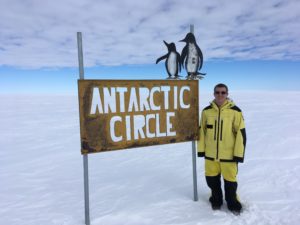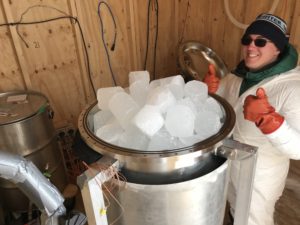
Shrewsbury – While many of us are shoveling out after another Nor’easter or braving the freezing temperatures as we emerge from our homes, Shrewsbury native Ed Crosier is most concerned with survival in one of the most extreme and uninhabited regions of the world – Antarctica.
A 2011 graduate of Shrewsbury High School and of Roger Williams University, Crosier now works with the University of Rochester studying ice core samples in Antarctica. The primary purpose of the study is to determine atmospheric composition before humans caused a significant increase in emissions of greenhouse gases. The team works to determine the levels of hydroxyl radicals within the ice core samples, a natural atmospheric purifier of sorts, which quickly becomes depleted and breaks down in the presence of pollutants. Through these ice core samples, scientists are able to determine the abundance of hydroxyl radicals dating back to the 19th century.
“Little is known about the historical record of hydroxyl radicals in the atmosphere; these are the first historical concentration measurements being made,” Crosier explained. “Atmospheric measurements have been made since the 1990s, but otherwise climate models are making an assumption, and the measurements we make will help to improve these models.”
In order to retrieve these ice core samples, Crosier and the team he is a part of spend 10 weeks in Antarctica’s Law Dome, a large dome of ice situated on Antarctica’s eastern edge. The project is co-funded by the Australian Antarctic Division and the U.S. National Science Foundation.
“Our team includes many people from both Australia and the United States,” Crosier said.
Because the team leaves for their expedition in early December, it means spending Christmas and New Years away from friends and family. However, if there is one thing that is guaranteed in Antarctica, it is a white Christmas, something Crosier and his team enjoyed – taking a needed hiatus from their research.
“Christmas day we took the day off,” Crosier recalled. “Weather-wise, it was one of the nicest days up on the dome. We had a very nice meal prepared by our field leader Sharon and our mechanic Jose… a really nice turkey dinner and a fancy dessert. We had drinks and hung out and the whole team got to know each other much better. Christmas was definitely a nice day to be able to take it all in and pretend like we were back at home by sharing a nice meal and stories.”
Being away from family during the holidays was not the only challenge Crosier and the expedition team faced during their time on the bottom of the planet. As expected, conditions were extreme.
During the 40 days Crosier slept in his tent at Law Dome, the sun never set, as the expedition occurred during Antarctica’s period of continual daylight. However, despite the lack of sunsets, snowfall was frequent and heavy.
“My tent would routinely be completely covered in snow when I woke up in the morning and I’d have to dig and gopher myself out from the inside,” Crosier added.
Antarctica is close to 10,000 miles away from Shrewsbury, where Crosier grew up. The positive impact of growing up in a supportive and engaging community, however, have not been lost on Crosier.
“Shrewsbury was a great place to grow up. Most of my best friends I have to this day I met through either school or sports in town,” Crosier said. “The school system definitely helped to mold me into the scientist I am today. I also had a few memorable teachers at Shrewsbury High School and Oak Middle school, including Amy Johnson and Jill Carter, who really kept my interest in science strong and eventually led me to study environmental chemistry and marine biology at Roger Williams University – where I got involved with research right away.”
While Crosier is just beginning of his scientific career, already taking him across the globe, he remains fond of his hometown, and perhaps one day might return home.
“Although Shrewsbury isn’t exactly a small town, it still has a nice community feel to it and I’d be happy to live there again someday,” he said.
Until then, however, Crosier looks to make his mark on an emerging scientific field in one of the most remote places on the globe.

photos/courtesy Ed Crosier

















